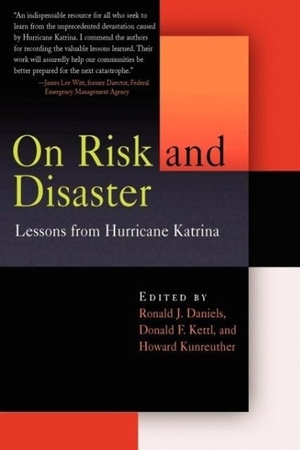Für statistische Zwecke und um bestmögliche Funktionalität zu bieten, speichert diese Website Cookies auf Ihrem Gerät. Das Speichern von Cookies kann in den Browser-Einstellungen deaktiviert werden. Wenn Sie die Website weiter nutzen, stimmen Sie der Verwendung von Cookies zu.
Cookie akzeptieren
On Risk and Disaster
- Lulu Press
- 2006
- Taschenbuch
- 304 Seiten
- ISBN 9780812219593
Leading experts address questions of public and private roles in assessing, managing, and mitigating major risks to public health and safety in light of the devastation caused by Hurricane Katrina. "This volume provides important insights from the nation's leading experts on how we, as a community and nation, should be rethinking disaster assessment, prevention, and mitigation. Policymakers, legislators, business leaders, and scholars: this is a must-read."--Jon Huntsman, Jr., Governor of Utah "An indispensable resource for all who seek to learn from the unprecedented devastation caused by Hurricane Katrina. I commend the authors for recording the valuable lessons learned. Their work will assuredly help our communities be better prepared for the next catastrophe."--James Lee Witt, former Director, Federal Emergency Management Agency "An enormously important volume that comes at just the right time. In the wake of Katrina, new thinking is urgently needed on how to manage catastrophic risk most effectively--especially regarding prevention and recovery. This precious volume offers insights on both fronts, with contributions from many of the nation's leading authorities on risk and disaster. It is a must-read for scholars and policymakers alike."--David A. Moss, Harvard Business School Hurricane Katrina not only devastated a large area of the nation's Gulf coast, it also raised fundamental questions about ways the nation can, and should, deal with the inevitable problems of economic risk and social responsibility. This volume gathers leading experts to examine lessons that Hurricane Katrina teaches us about better assessing, perceiving, and managing risks from future disasters. The 20 contributors to this volume address questions of public and private roles in assessing, managing, and dealing with risk in American society and suggest strategies for moving ahead in rebuilding the Gulf coast. Contributors: Matthew Adler, Vicki Bier, Baruch Fischhoff, Kenneth R. Foster, Robert Giegengack, Peter Gosselin, Scott E. Harrington, Carolyn Kousky, Robert Meyer, Harvey G. Ryland, Brian L. Strom, Kathleen Tierney, Michael J. Trebilcock, Detlof von Winterfeldt, Jonathan Walters, Richard J. Zeckhauser. Ronald J. Daniels is Provost and Professor of Law at the University of Pennsylvania. He has published widely, including Rethinking the Welfare State: The Prospects for Government by Voucher (with Michael Trebilcock) and The Security of Freedom: Essays on Canada's Anti-Terrorism Bill (coedited with Patrick Macklem and Kent Roach). Donald F. Kettl, Professor of Political Science and Director of the Fels Institute of Government at the University of Pennsylvania, has written or edited System under Stress: Homeland Security and American Politics, The Global Public
Mehr
Weniger
zzgl. Versand
Etwa 20 Tage